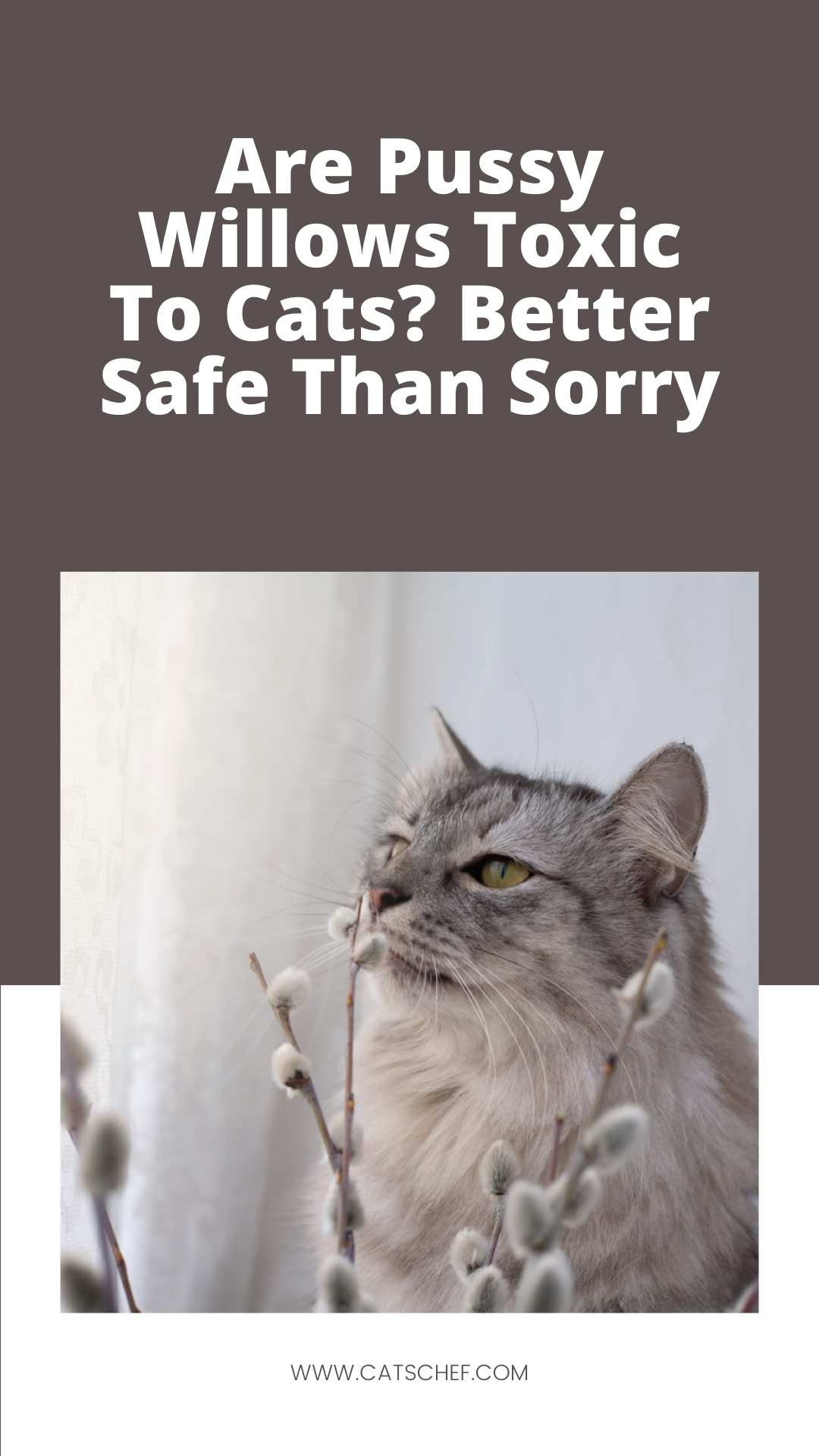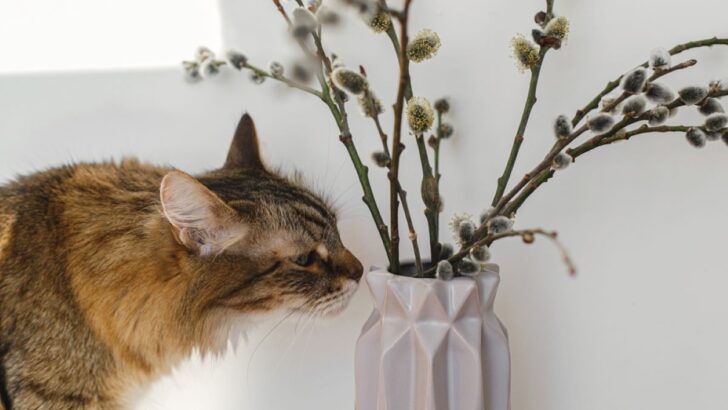“Help! Are pussy willows toxic to cats? I saw my kitty munching on it, and now I’m worried sick!”
If these are your exact thoughts, then don’t worry! You’ve come to the right place! In this article, we’re going to talk about pussy willows and whether they are bad for our dear furbabies or not.
We all know how cats can be naughty sometimes. Their mischievousness is often manifested in nibbling on our beloved plants and digging out the dirt from the plant pots. No matter how hard we try to keep our little rascals away from our plants, they will still find their way back to them.
And the worst part is that we cannot even let ourselves be angry with them since we constantly have to worry if they had eaten a piece or two and whether it is poisonous for them or not.
It’s a struggle to keep up with your fluffball’s nibbling habits. Especially if you’ve spent too much time away from home. The worst-case scenario is constantly in the back of your mind. No matter how hard you try, there’s always that little negative voice in your head that says your cat ate something she wasn’t supposed to.
But that negativity comes from good intentions, and it’s there because you care. So, don’t worry! Having a vase with plants that are bad for cats doesn’t make you a bad cat parent. Believe me when I say you can be both – a plant and a cat mom – and have the best of both worlds!
You just have to learn how to balance those two without one excluding the other. And hopefully, this article will help you with that as well.
So without further ado, let’s tackle the topic of pussy willows and their relationship with cats.
What are pussy willows, anyway?
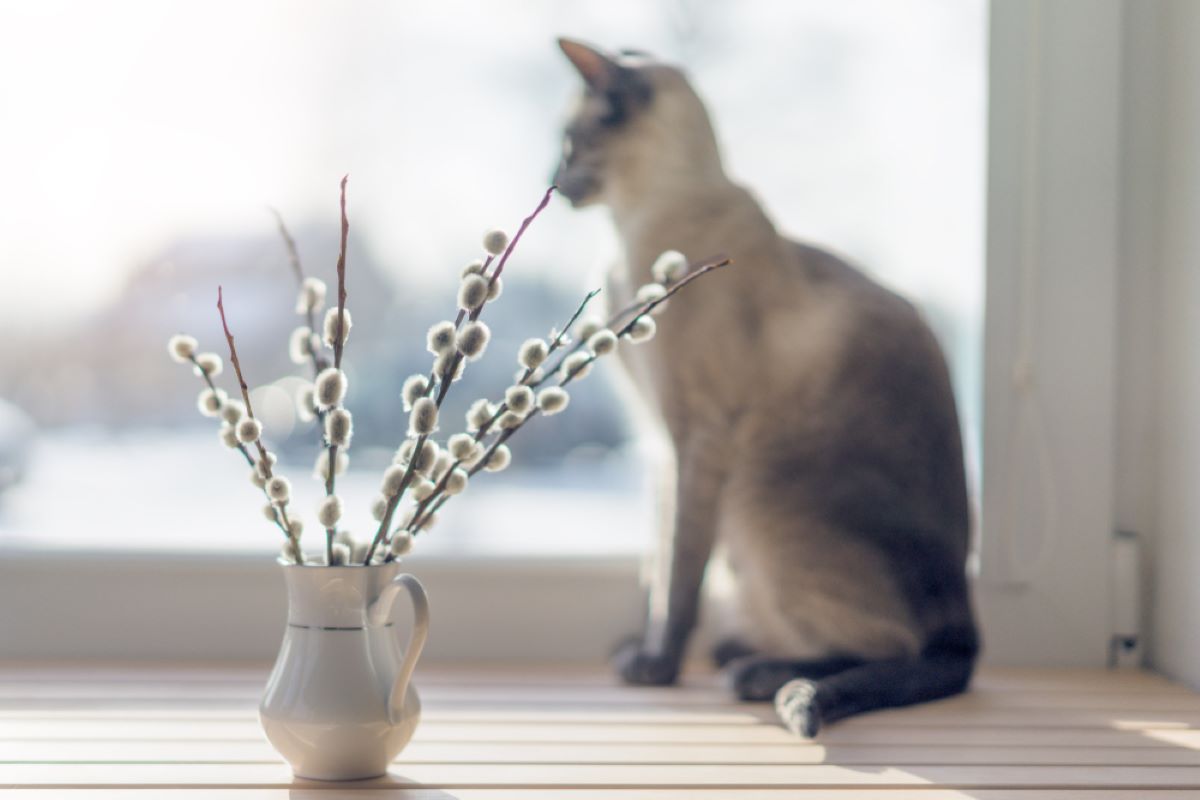
Interestingly enough, pussy willows were actually named after our beloved feline friends. Because they look like silver tufts and bear a resemblance to fuzzy cat paws, they are usually kids’ favorite plants who often believe them to be fluffy little animals instead of plants.
But, what actually are pussy willows?
They are, in fact, considered to be flowers right before they fully bloom. Know as Salix discolor, pussy willows are one of the first bloomers, and they signify the end of the cold winter and the approach of the lovely spring.
Even when they’re fully bloomed, they hardly resemble flowers. They have no petals or flashy colors. And they also bear no fragrance. Flowers like that are called catkins (again, named after cats). Many other trees and shrubs also produce catkins.
Pussy willows are dioecious, which means there are both male and female plants. But, male plants have that fuzzy appearance, while females resemble funky greenish caterpillars.
Are pussy willows toxic to cats?
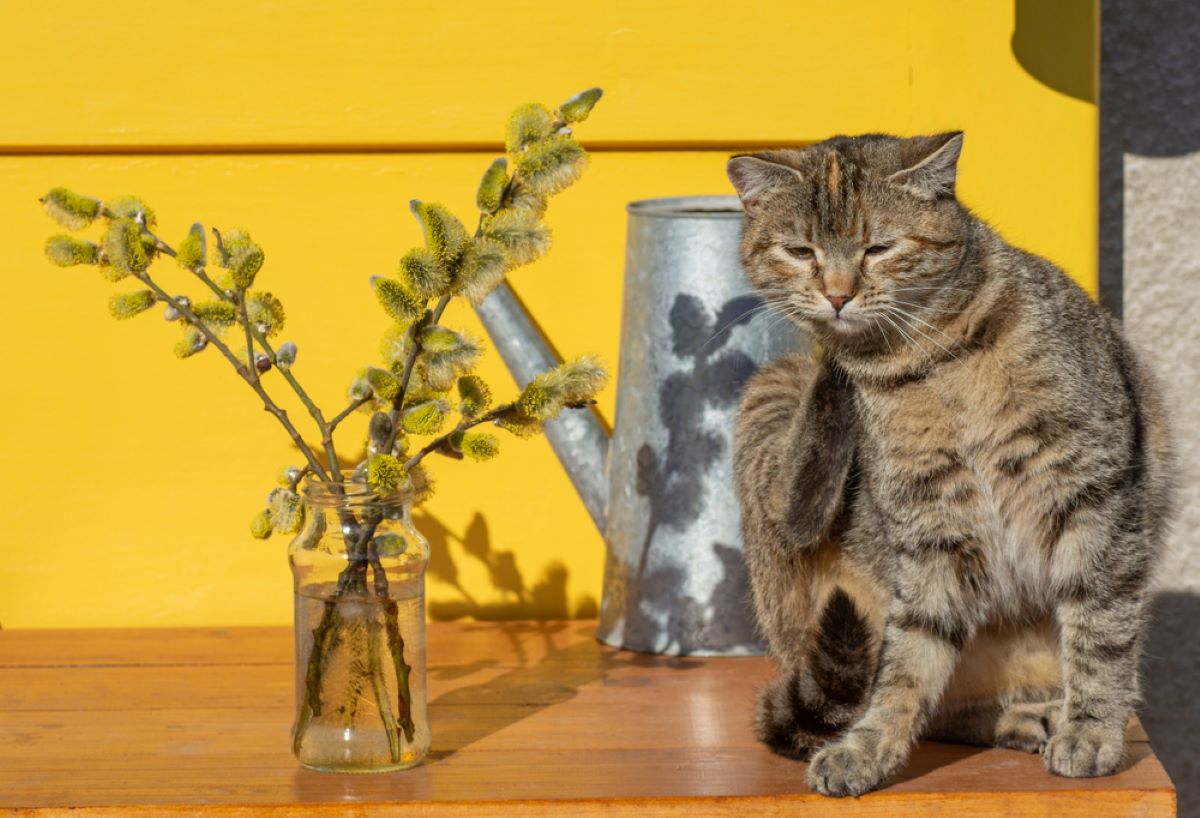
Cats are known to be obligate carnivores. But they are also obligate nosy parkers. They have to stick their little noses into everything, including every plant you bring home.
But what happens when you bring pussy willows to your living room and your cat accidentally eats them? Are pussy willows toxic to cats?
Luckily for you, if you saw your cat munching on this fuzzy flower, there’s no need to worry. Pussy willows are listed among the plants that are non-toxic to cats.
However, just because something is not considered toxic to your feline doesn’t mean you should let her eat it. The fuzz of the pussy willow can significantly damage your cat’s gastrointestinal tract, especially if eaten in large amounts.
There’s no need to worry if your cat eats a little piece of it, but you should keep it away from her just in case she decides to snack on it again.
Why is it important to watch the amount of pussy willow your cat eats?
Well, because pussy willows contain salicin, which when metabolized, turns into salicylic acid. Your cat’s gastrointestinal tract is extremely sensitive to it, and overconsumption can lead to ulceration, throwing up, abdominal pain, and more.
So, even though pussy willows are considered to be non-toxic to cats, consumption of a large amount of it can have a serious, toxic outcome.
How to keep your cat away from pussy willows?
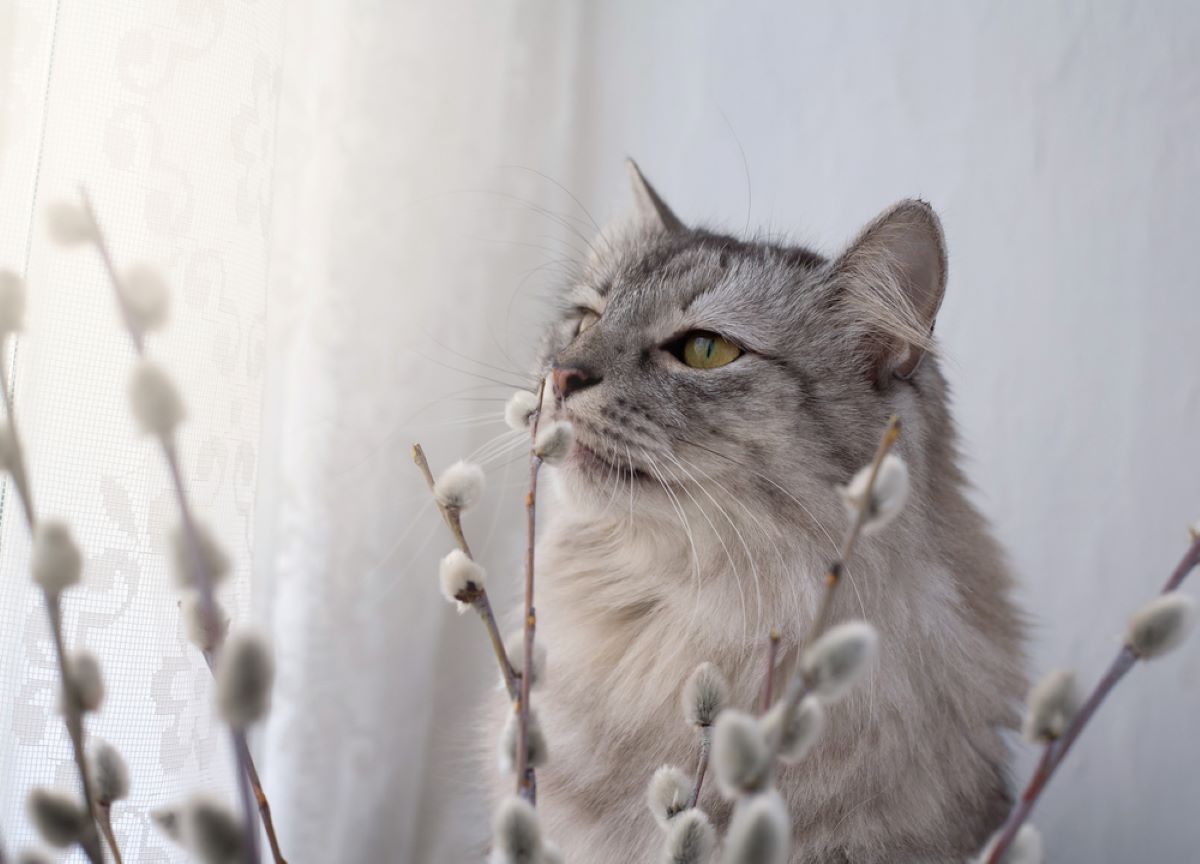
It’s hard to keep your cat away from pretty much anything. Sometimes I think that in order for my kitty to be safe while I’m away, there has to be nothing except her toys, cat trees, and cat food in my apartment. But that’s virtually impossible.
Even though the connection is strong between pussy willows and pussycats, there are certain things you can consider doing in order to keep your kitty away from these potentially dangerous flowers. Apart from saying a little prayer to cat gods, of course.
1. Choose non-toxic plants for your garden and home
This is the most obvious one, but the one that’s most difficult for proud plant parents to accept. To keep your kitty safe, replace your existing plants with cat-friendly ones.
There is a list of non-toxic and cat-safe plants approved by ASPCA that I encourage you to check out. Some of those plants are African violet, Baby tears, Bamboo, Coral bell, Dahlia, Fuchsia, Gerber daisy, and many others.
2. Keep pussy willow out of reach
If you refuse to get rid of your precious vase filled with pussy willows, I totally understand! There’s a way to work with that as well.
Keep the pussy willow out of your kitty’s reach. I know it’s hard to do that since our initial instinct is to put it someplace high, and cats are experts at jumping and climbing. Still, I’m sure there’s a way to keep the flowers somewhere she can’t reach them.
You can, for example, keep pussy willows in a room where your cat usually doesn’t go to.
On the other hand, if you want to plant some pussy willows in your garden, there are a few things you can do. If your cat has access to your garden, use water to your advantage.
We all know cats aren’t the biggest fans of water and I’m sure your kitty will choose to stay away from your plants once she realizes that she gets wet every time she approaches them. So, place some motion-activated sprinkles in your garden and you’ll save yourself a lot of trouble.
Also, separate your plants from the rest of your garden using a fence. Maybe she won’t like the idea of jumping over it just to sniff some plants. Maybe…
3. Distract your kitty
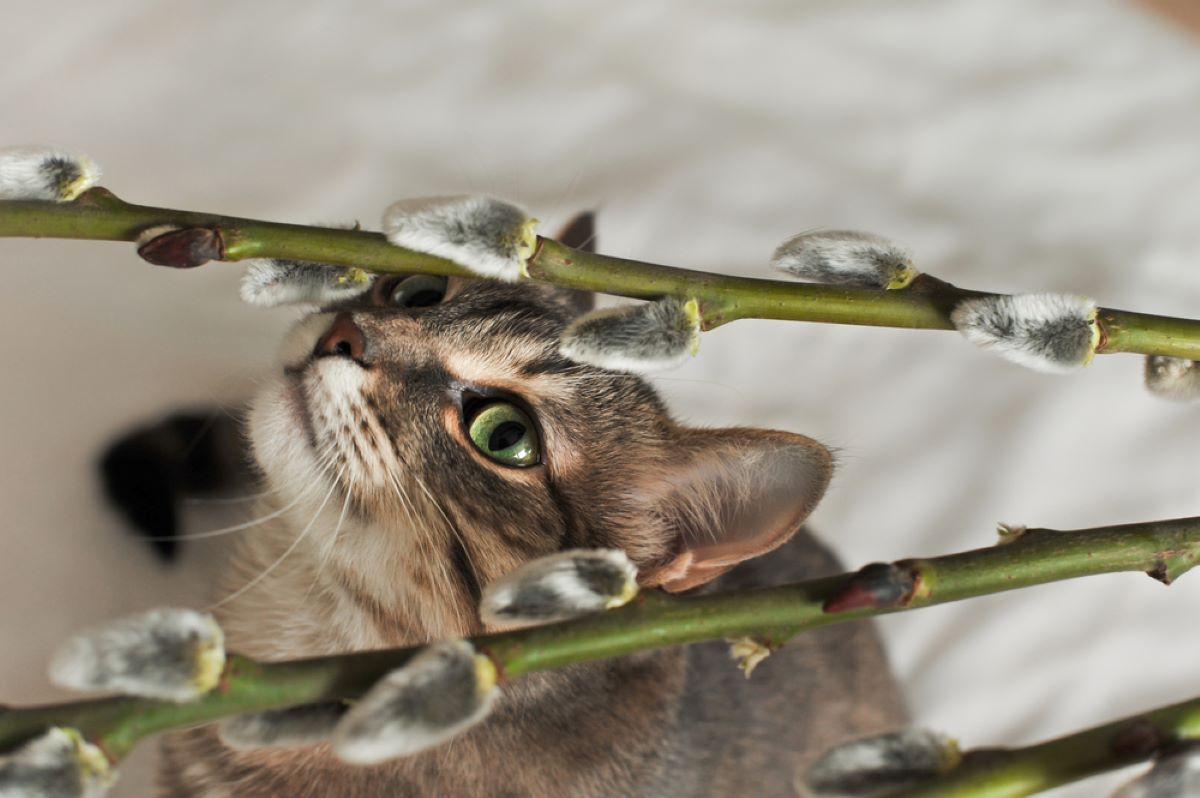
Cats usually misbehave when they’re bored. They will do many naughty things solely because they don’t know what to do with all that energy they have.
In order to keep your kitty away from pussy willows, or from any plants whatsoever, provide distractions for her. Play with her regularly, and offer her many interesting toys and cat accessories, so she could always have something to do, even when you’re not around.
4. Use deterrents
You can also make sure your cat doesn’t nibble on pussy willows by spraying them with cat-repellent sprays. There are many cat repellents on the market, but you can even DIY your own by mixing lemon and water.
Other smells cats usually dislike are the smell of coffee grounds, any citrusy scents, vinegar, pipe tobacco, lemongrass, lavender oil, and others.
The bottom line
As with pretty much all flowers, like roses or dandelions, for example, a small bite or two of pussy willow shouldn’t be alarming. But if they consume a large amount, then it’s time to worry!
However, if you make sure your kitty can’t reach the evil flower and is well entertained by other means, then everything should be fine.
There’s no need for you to sacrifice your hobbies and passions because of your fluffball. You can enjoy everything with her by your side – as long as you make sure she knows (at least to some degree) what she can’t and cannot do.
